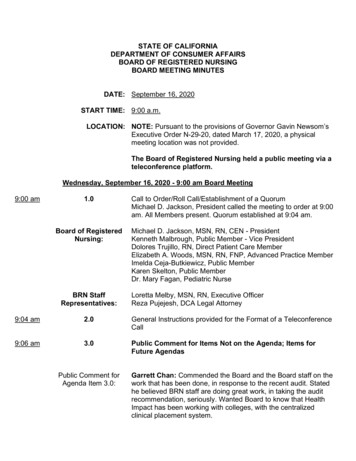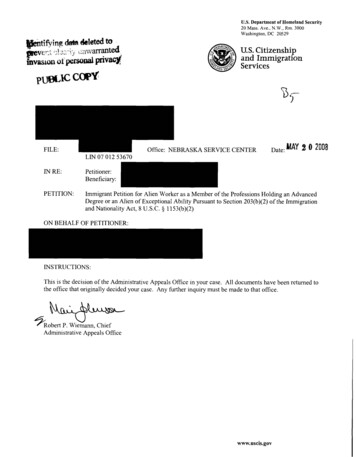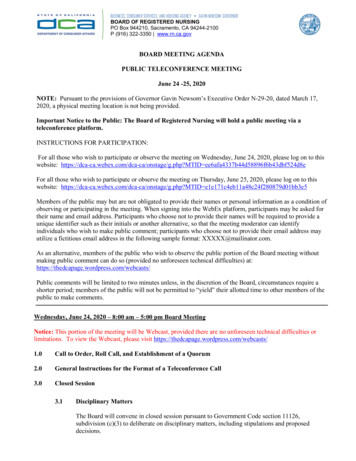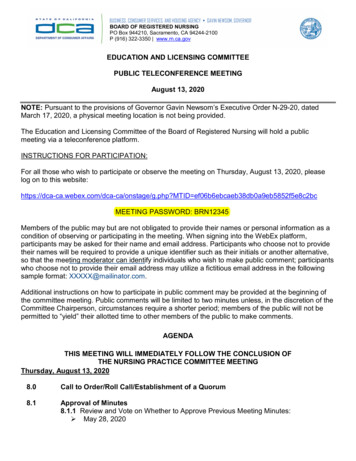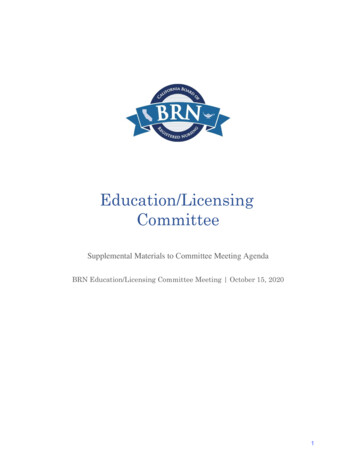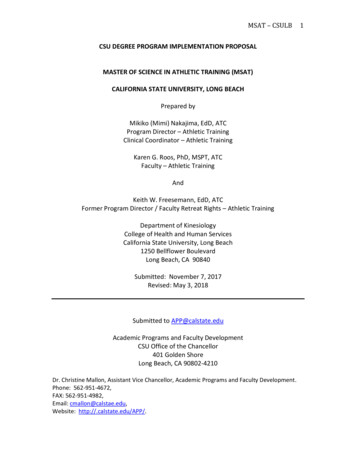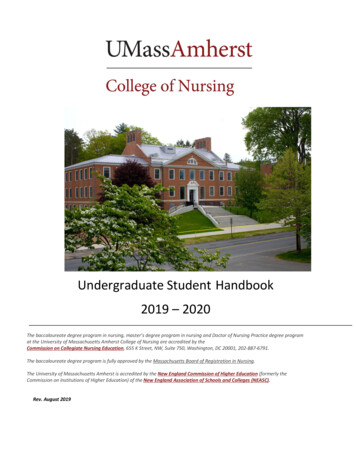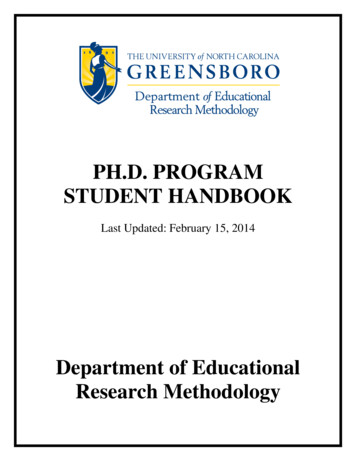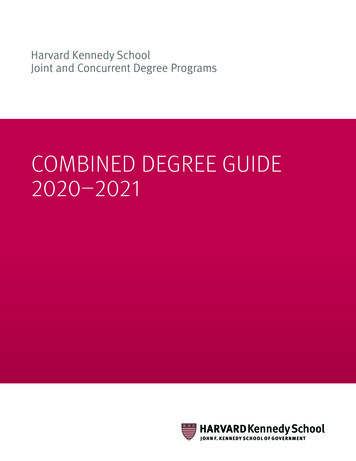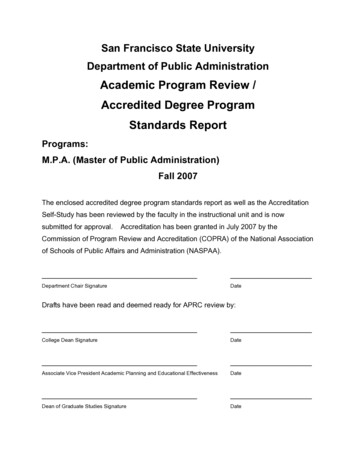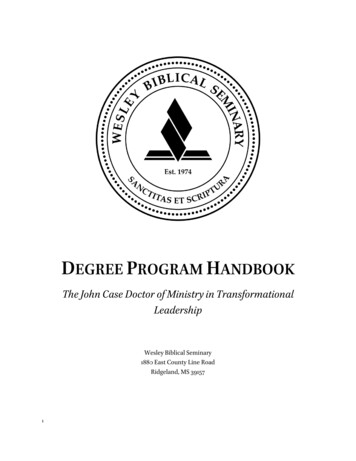
Transcription
DEGREE PROGRAM HANDBOOKThe John Case Doctor of Ministry in TransformationalLeadershipWesley Biblical Seminary1880 East County Line RoadRidgeland, MS 391571
DMin Program HandbookDocument Date: November 2, 2020TABLE OF CONTENTS1.0 Our Mission . 42.0 Program Overview. 43.0 Program Goals . 44.0 Doctor of Ministry Curriculum . 55.0 Doctor of Ministry Course Cycle . 56.0 Doctor of Ministry Course Descriptions. 67.0 Doctor of Ministry Degree Map . 88.0 Writing the Dissertation. 109.0 Types of Dissertations . 109.1 Ministry Design .109.2 Theological Appropriation .109.3 Case Study. 119.4 Comparative Analysis . 1110.0 The Dissertation Prospectus .1111.0 Research Duration . 1212.0 Working with the Committee . 1213.0 Submitting and Defending the Dissertation . 1314.0 Assessment Standards . 1315.0 Style Requirements and Editorial Assistance . 1416.0 Dissertation and Graduation Date . 1517.0 Continuation Fee . 1518.0 Satisfactory Academic Progress . 1519.0 Time Limits for Completion of Degrees . 1520.0 Graduation Requirements . 1621.0 Payment Options for Doctor of Ministry Students . 1621.1 Full Payment each term . 1621.2 Deferred Payment Plan . 162
DMin Program HandbookDocument Date: November 2, 202021.3 Loan agreement . 16Appendix 1. Prospectus Outline . 17Appendix 2. Dissertation Components/Structure . 183
DMin Program HandbookDocument Date: November 2, 20201.0 OUR MISSIONWesley Biblical Seminary exists to educate and train men and women who, in fulfillment of theChurch’s mission, will live and proclaim Trinitarian faith, promote the Spirit-filled life, and in fullcommitment to the absolute authority of the Bible, actively make disciples of Jesus Christ.2.0 PROGRAM OVERVIEWThe John Case Doctor of Ministry (D.Min.) in Pastoral Leadership for Transformation Ministry isnamed for Dr. John Case in honor of his outstanding pastoral ministry and with gratitude for his longtime support of Wesley Biblical Seminary. The D.Min. is a professional in-ministry doctorate thatoffers advanced ministerial education to experienced pastors and other Christian workers.The purpose of this degree is to advance the mission of Wesley Biblical Seminary by developingtransformational leaders for church and society through critical study, analysis, reflection, andapplication at the professional doctoral level. The degree is intended for those who have earned aMaster of Divinity or equivalent and are currently serving in a ministry position in a church, a churchrelated institution, or a parachurch organization.The in-ministry nature of the D.Min. allows pastors and other Christian workers to pursue rigorousadvanced study without leaving their ministry setting. The degree is designed to be completed inthree years, which includes two years of coursework (24 credit hours) and one year from writing anddefending the Dissertation Ministry Research Project (6 hours).3.0 PROGRAM GOALSStudents who receive the Doctor of Ministry degree from Wesley Biblical Seminary will growsignificantly in their intellectual, professional, ethical, and spiritual lives, as will be evidenced byexcellence in their commitment and ability to: 4Goal 1: Proclaim the message of the Bible to the contemporary world with accuracy andcultural sensitivity but without compromising the authority of Scripture.Goal 2: Articulate both the essential outlines of Trinitarian orthodox theology and thedistinct contribution of Wesleyan soteriology, their grounding in Biblical Revelation, andtheir implications for ministry practice.Goal 3: Practice biblical means of grace for a deepening spiritual life, lead others to do thesame, and articulate a practical “sacramental theology” of discipleship.Goal 4: Demonstrate in verbal expression and in concrete action how the practice ofChristian ministry and leadership grows out of the theological commitments andimplications of Christian orthodox theology.Goal 5: Analyze the systemic dynamics of a local church or other Christian ministry andfacilitate the movement of congregations and ministries toward greater spiritual health.
DMin Program HandbookDocument Date: November 2, 2020 Goal 6: Analyze the ideological commitments that give shape to the moral, social andpolitical values of the culture at large.Goal 7: Lead the local congregation or other Christian ministry to engage the needs of itsparticular context in a holistic manner.Goal 8: Cast a vision for ministry by one’s own servant-focused example and throughworldview shaping, biblically based, and theologically sound teaching and preaching.4.0 DOCTOR OF MINISTRY CURRICULUMTwo distinct phases comprise the D.Min. curriculum: (1) a coursework phase and (2) a dissertationphase. The D.Min. academic year is divided into two terms. The coursework phase of the D.Min. isdesigned to be completed in two years of two terms each. Spring-Summer Term (April 1 through September 30)Fall-Winter Term (October 1 through March 31)Each term will include a five-day on-campus intensive period. That intensive period falls in June forthe Spring-Summer Term and in January for the Fall-Winter Term. Each term offers two requiredcourses that are consistently paired together, and students are expected to take both courses in eachterm. This allows students to enter the program at the start of either term and still complete all coursework in four consecutive semesters. Beyond the intensive on-campus period, each course will requirestudents to participate in online learning sessions utilizing Populi and Zoom.5.0 DOCTOR OF MINISTRY COURSE CYCLESpring-Summer Term (with intensive on-campus seminars in June) DM 801 Advanced Biblical Hermeneutics for Relevant Preaching and Ministry (3 hrs)DM 802 Transformational Preaching (3 hrs)Fall-Winter Term (with intensive on-campus seminars in January) DM 803 Sacramental Spirituality and Disciple-Making Leadership (3 hrs)DM 804 Holistic Renewal of the Church (3 hrs)Spring-Summer Term (with intensive on-campus seminars in June) DM 805 Wesleyan Practices in Community Formation and Social Transformation (3 hrs)DM 806 Wesleyan Theological Vision for Community Formation in the Post-ModernContext (3 hrs)Fall-Winter Term (with intensive on-campus seminars in January) 5DM 807 The Gospel as Truth in a Multi-Religious World (3 hrs)DM 808 Secular “isms” that Challenge the Faith and Confront the Church (3 hrs)
DMin Program HandbookDocument Date: November 2, 2020Ministry Research Project Courses DM 809 D.Min. Project Research Orientation (0 hrs)DM 810 Ministry Research Project (6 hrs)6.0 DOCTOR OF MINISTRY COURSE DESCRIPTIONSDM801 Advanced Biblical Hermeneutics for Relevant Preaching and MinistryThis course is taught concurrently with its related course, DM802 Transformational Preaching. Itfocuses on four areas crucial to effective biblical preaching: (a) the integrity of the biblical canon andissues and principles relevant for preaching from each part of that canon, (b) the importance of andprinciples for understanding each biblical book in terms of its literary genre and integrity, (c) therelevance of and ability for understanding the Bible within the environment of the Ancient Near Eastand the first century Hellenistic world, and issues that arise when we attempt to apply biblicalteaching in the contemporary world. The course assumes a basic knowledge of the principles ofbiblical interpretation. 3 hoursDM802 Transformational PreachingThis course is taught concurrently with its related course, DM801 Advanced Biblical Hermeneutics forRelevant Preaching and Ministry. It focuses on the theology and practice of preaching as a means ofgrace for creating and building Christian community around the Gospel’s focus upon discipleship,holy living and transforming servanthood in the world. The course rigorously examines thetheological purposes, hermeneutical principles, and communicative skills that are essential tobiblically sound and effective preaching. 3 hoursDM803 Sacramental Spirituality and Disciple-Making LeadershipThis course is taught concurrently with its related course, DM804 Holistic Renewal of the Church. Itengages students in the study of diverse views of the sacraments and the classical spiritual disciplinesfor the purpose of enabling them to think deeply about how the corporate life of churches and thediscipleship of believers are shaped by the theology embedded in these practices. Students willengage in research that helps them understand the commonalities and differences of variousChristian traditions. 3 hoursAdditionally, students will be expected to develop a plan of personal participation in sacramentalpractices and spiritual disciplines as well as giving leadership to others in small groups formed aroundthe sacramental practices and spiritual disciplines. The goal of the course is for students to develop amore robust and intentional understanding of how a recovery of vibrant sacramental practices can (a)undergird the disciple-making programs of a local church, (b) provide a rich and historically rootedbasis for establishing in congregants’ minds a sense of their corporate identity as a local community offaith, and (c) establish a Christologically centered, missionally oriented focus for pastoral leadershipin the life of the church. 3 hours6
DMin Program HandbookDocument Date: November 2, 2020DM804 Holistic Renewal of the ChurchThis course is taught concurrently with its related course, DM803 Sacramental Spirituality andDisciple-Making Leadership. It focuses on local church participation in evangelistic and discipleshipministries that are coupled with compassionate social ministries. An investigation of the biblical andhistorical emphases of the church on these matters is included and the transformative personal,corporate, and cultural power of their coupling demonstrated. The spiritual life and worshipstructures of the church should support the outward missional life of the church. Therefore, theeffective meshing of these critical components will be viewed in order to build a biblically fruitfulchurch that contributes to both church health and societal welfare. 3 hoursDM805 Wesleyan Practices in Community Formation and Social TransformationThis course is taught concurrently with its related course, DM806 Wesleyan Theological Vision forCommunity Formation in the Post-Modern Context. It engages students in an in- depth study of thesocio-historical context of the eighteenth-century evangelical revival led by John Wesley and the earlyMethodists. The purpose is to show how the pastoral orientation, the practices of personal piety, andthe risk-taking spirit of these leaders sustained a movement that led to significant ecclesial renewaland social transformation. Attention will be given to the transitions and social upheaval that markedWesley’s England and their similarities to twenty-first century Western culture. The goal is to showthat the ministry practices of the early Methodists provide a framework for ministry from whichpractices can still be gleaned to foster church revitalization and social transformation. 3 hoursDM806 Wesleyan Theological Vision for Community Formation in the Post-Modern ContextThis course is taught concurrently with its related course, DM805 Wesleyan Practices in CommunityFormation and Social Transformation. It engages students in the theological vision that has providedthe motivation, focus, and spirituality of the Methodist/Wesleyan tradition at its best. Specialattention will be given to the ordo salutis (theology of salvation) that John Wesley and the earlyMethodists bequeathed to subsequent generations. Further attention will be given to how theoptimistic view of God’s grace in human life not only provided an evangelical counter proposal toeighteenth-century English Calvinism, but also drove early Wesleyans to see social transformation asinherent in the Gospel. The goal is to enable those engaged in ministry in the twenty-first century todiscover the theological resources offered by this Wesleyan understanding of the universal andtransformative scope of saving grace. 3 hoursDM807 The Gospel as Truth in a Multi-Religious WorldThis course is taught concurrently with its related course, DM808 Secular “isms” that Challenge theFaith and Confront the Church. It engages students in a comparative study of the nature and content ofChristian theism in contrast to other world religions and their corresponding worldviews. The goal isto increase the competency of students when interacting with and explaining other religious7
DMin Program HandbookDocument Date: November 2, 2020worldviews to their congregations, and to deepen their confidence as Christian preachers andteachers in our increasingly multicultural age. 3 hoursDM808 Secular “isms” that Challenge the Faith and Confront the ChurchThis course is taught concurrently with its related course, DM807 The Gospel as Truth in a MultiReligious World. It involves students in a rediscovery of essential Christian orthodoxy and itsengagement with various non-theistic, naturalistic, and secular philosophical systems that have risenover the last two hundred years in Western culture. The goal of the course is to equip those whopreach, teach, or engage in evangelistic ministries to have greater competency in interacting with,explaining, and critiquing these “isms” for contemporary believers and seekers. Special emphasis willbe given in the course to competing belief and value systems that make up the so-called “postmodern”perspectives on truth, meaning, and moral values. 3 hoursDM 809 Project Research OrientationStudents may enter the DM809 Project Research Orientation as soon as they are admitted to thedegree program. However, they must enter the course site during the second term intensive to beginlooking at materials there. In this non-credit course, the student learns to create a prospectusdocument, which is a substantial, detailed, overview of her/his dissertation project with extensivebibliography. The DM809 course site has instructive videos and prospectus examples available. TheDirector of Research will help each student on an individual basis. The student is re-enrolled in thiscourse until he/she has a prospectus approved by the faculty. At the next term after prospectusapproval, the student moves up to DM 810. 0 hoursDM 810 Ministry Research ProjectThe DM 810 is the intensive writing phase of the dissertation project. After having a prospectusapproved, the student is given two faculty advisers and begins writing the dissertation. Students areenrolled in this course until they successfully defend their dissertation. Details about style andpresentation of the dissertation are found in the WBS Handbook for Writing Theses and Dissertations. 6hours7.0 DOCTOR OF MINISTRY DEGREE MAPCOURSEWORK PHASE (TWO YEARS)TermTerm 18Tasks Enroll in offered courses and DM809Attend on-campus intensive (January or June)Watch research orientation videos in DM809 (Populi)Read relevant chapters on D.Min. researchBegin considering topics for the dissertation
DMin Program HandbookDocument Date: November 2, 2020Term 2 Enroll in offered coursesAttend on-campus intensive (January or June)Discuss dissertation topics with the Director of ResearchBegin drafting Dissertation ProspectusBegin gathering sources for the literature reviewTerm 3 Enroll in offered coursesAttend on-campus intensive (January or June)Begin drafting literature reviewSubmit final draft of Dissertation Prospectus to Director of ResearchTerm 4 Enroll in offered coursesAttend on-campus intensive (January or June)Attend Dissertation Prospectus Faculty Review (via Zoom) scheduled bythe Director of Researcho Upon Prospectus approval, the Director of Research will assignPrimary Supervisor and Second Readero Upon Prospectus approval, student will be enrolled in DM810DISSERTATION WRITING PHASE (14 MONTHS) 9Conduct research for the dissertation.Write dissertation. The Primary Supervisor will be the chief contact person during thewriting phase.Provide a finished dissertation manuscript to the Second Reader, who will examine thedissertation and offer suggestions for improvement.Once the Second Reader’s comments have been incorporated into the project, submitdissertation to the Director of Research. Upon submission, the Director of Research willprovide a copy of the submitted dissertation to the Primary Supervisor and Second Readerand schedule the dissertation defense for a date no later than six weeks after the date ofsubmission.Defend dissertation.Complete any necessary revisions to the dissertation and submit final copy to Director ofResearch.Complete TREN release and submit to the Director of Library ServicesIf you opt-in to TREN copyright registration, pay current fee through the Director ofBusiness Affairs.Return any library books.Pay any outstanding bills.Submit final approved version of dissertation to the Director of Library Services inMicrosoft Word format.
DMin Program HandbookDocument Date: November 2, 20208.0 WRITING THE DISSERTATIONThe dissertation is the culmination of the D.Min. degree. It is an integrative project that combinesinsights from the student’s coursework with independent research that is oriented toward thepractice of ministry. The dissertation should address a pastoral situation or problem boththeologically and practically. The focus is on finding biblically sound and carefully reasoned solutionsto problems that arise in the context of ministry. A successful dissertation will effectively demonstratethe student’s competency in identifying a problem, analyzing relevant literature, designing a solution,and evaluating the results.9.0 TYPES OF DISSERTATIONSDoctor of Ministry dissertations vary in the problems they address and in the methods employed toaddress those problems. Whether the dissertation is more practical or more theoretical, all D.Min.research projects focus on solving a clearly articulated problem faced in the context of Christianministry.9.1 Ministry DesignOne common approach to the D.Min. dissertation is the ministry design (or in-ministry project).1 Thistype of project identifies the need in ministry for a specific program or ministry, usually in a localchurch, and creates a formational curriculum or plan to strengthen participants in the area inquestion. Such a dissertation will integrate theological reflection on the topic in focus with practicalstrategies for equipping participants for thoughtful and faithful ministry. Successful dissertations willeffectively measure the growth of those who participate in the program.9.2 Theological AppropriationThis type of dissertation will take a specific doctrine or area of theology and appropriate it in light of aspecific pastoral problem. This will require a detailed account of the theological area underconsideration. That account would need to employ an appropriate theological method (e.g., biblicaltheology, textual exegesis, historical theology, systematic theology) and be thoroughly conversantwith relevant scholarly literature on the topic. Such a dissertation will also require a doctoral-levelanalysis of the pastoral problem to be addressed. Examples include but are not limited to churchunity and factionalism, marriage and divorce, clinical depression, political engagement, parenting,racism, etc. A successful dissertation of this sort would then build on the theological account and theanalysis of the problem to develop a series of pastoral strategies for appropriating the theologicaltopic in question to address the problem in local church settings. Any number of topics might be1Nancy Jean Vyhmeister and Terry Dwain Robertson, Quality Research Papers: For Students of Religion andTheology (Grand Rapids: Zondervan, 2014), 45–52, 87–88.10
DMin Program HandbookDocument Date: November 2, 2020proposed; the following are provided for illustrative purposes: justification by faith and racial/ethnichealing, a trinitarian approach to pre-marital/marriage counseling, the Incarnation and ministry withthe poor, the doctrine of holiness in churches marked by political conflict, preaching text-orientedsermons in a screen-saturated culture, the Incarnation and generosity, justification by faith and theexperience of shame, the science of spiritual formation, cruciformity and pastoral suffering, holinessand moralistic therapeutic deism, etc.9.3 Case StudyA case study offers a full picture of a particular individual or group including their background,context, and status to provide a full and detailed presentation of the person or group. 2 This sort ofstudy aims to learn from the past in order to plan for the future. For example, a church’s ministry witha specific group of people might be studied in detail in order to articulate strategies for future similarministries. When a D.Min. dissertation takes the form of a case study, it should include significanttheological reflection on the circumstances of the case in question. A case study typically involves fourparts: observation, analysis, interpretation, and action.39.4 Comparative AnalysisA comparative analysis takes up two or more historical or present-day approaches to a currentproblem in ministry and evaluates their relative strengths and weaknesses. Drawing on thatevaluation, the dissertation will typically articulate a fresh approach to the problem that is alsogrounded in serious theological reflection on the problem under investigation. A comparative analysiswill likely depend heavily on relevant published work as data for analysis, but it may also benefit frominterviews with practitioners of the approaches under consideration.The D.Min. dissertation is not necessarily limited to one of the above categories, though these arecertainly common. Whatever approach is taken, the problem to be addressed must be clearlyarticulated and the methodology to address it must be followed carefully and appropriate fordoctoral-level studies.10.0 THE DISSERTATION PROSPECTUSStudents should begin thinking about possible topics and methods for the dissertation early duringthe coursework phase of the D.Min. program. In consultation with the Director of Research, studentswill write a Dissertation Prospectus that proposes the problem to be addressed, the methodology foraddressing it, and initial theological reflection on the problem. The Director of Research is available112Vyhmeister and Robertson, Quality Research Papers, 53.3For a description of each part, see Vyhmeister and Robertson, Quality Research Papers, 55–62.
DMin Program HandbookDocument Date: November 2, 2020for appointments via phone or Zoom to discuss potential avenues for research. In most cases, studentswill write multiple drafts of the prospectus in order to refine their research questions and methods.When a satisfactory draft of the prospectus is complete, the Director of Research will schedule aFaculty Review in which the student will present the proposed research to the faculty and answerquestions about the prospectus from the faculty. The Faculty Review may conclude with one of thefollowing outcomes: Approved with no revisions – This means that the student has written a prospectus at thehighest level of excellence, and that the faculty are confident that the student has produced asatisfactory plan for researching and writing the dissertation.Approved with revisions to the satisfaction of the Primary Supervisor – This means that thestudent has written a very strong prospectus and that any remaining weaknesses may beworked out in consultation with the Primary Supervisor as the research is conducted.Approved with revisions to the satisfaction of the Director of Research – This means that theprospectus has more substantive weaknesses that need to be resolved prior to theappointment of the Primary Supervisor.Prospectus not approved – This means the prospectus has substantial weaknesses that needto be addressed. The prospectus must be rewritten and resubmitted for another FacultyReview.Upon the completion of the Faculty Review, the Director of Research will communicate the outcomeof the Faculty Review to the student. If the prospectus is approved, the Director of Research willassign the student to a Primary Supervisor and a Secondary Reader, who will together constitute thestudent’s Dissertation Committee.11.0 RESEARCH DURATIONUpon the completion of the coursework component and the research prospectus has been approvedby the faculty, a fourteen-month period commences during which the student should research andwrite the dissertation. The fourteen months are comprised of a full academic year plus one summer.12.0 WORKING WITH THE COMMITTEEOnce the committee is appointed, the Primary Supervisor will be main contact for the student. Thestudent should contact the Primary Supervisor immediately after the appointment is made in order todiscuss expectations of the supervisory relationship, timeline, and initial plans for the execution ofthe project. The Director of Research may be consulted with regard to administrative matters, butonce the Primary Supervisor has been appointed, the Director of Research will defer to the PrimarySupervisor on all matters relating to the substance of the dissertation.12
DMin Program HandbookDocument Date: November 2, 2020The Second Reader is not expected to be deeply involved in the supervisory process until a full draft ofthe dissertation is complete to the satisfaction of the Primary Supervisor. When such a draft iscomplete, the Second Reader will read the full draft and offer a written response that articulates anyweaknesses to be addressed or matters to be fine-tuned. The student may then integrate therecommendations of the Second Reader into the dissertation prior to formal submission.13.0 SUBMITTING AND DEFENDING THE DISSERTATIONAfter the recommendations of the Secondary Reader have been received by the student andincorporated into the dissertation, the student will submit the dissertation to the Director of Researchelectronically via email. The Director of Research will then schedule a formal defense of thedissertation. The formal defen
Nov 02, 2020 · DM802 Transformational Preaching This course is taught concurrently with its related course, DM801 Advanced Biblical Hermeneutics for Relevant Preaching and Ministry. It focuses on the theology and practice of preaching as a means of grace for creating and building Christian community arou

